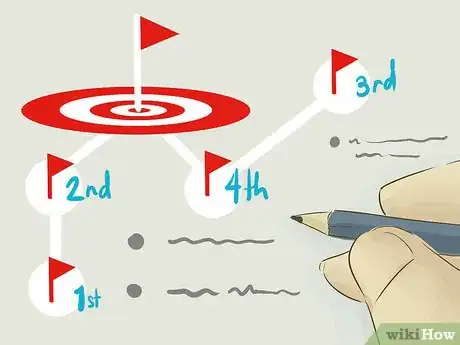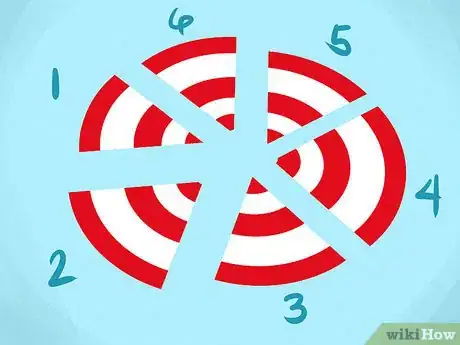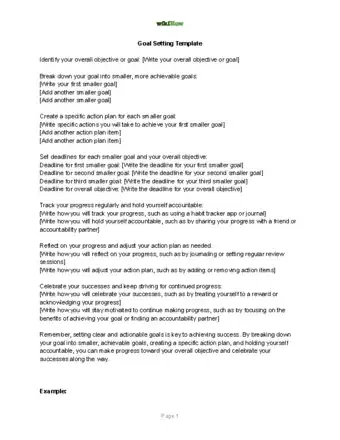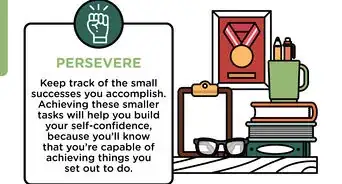This article was co-authored by Sydney Axelrod. Sydney Axelrod is a certified life coach and the owner of Sydney Axelrod LLC, a life coaching business focused on professional and personal development. Through one-on-one coaching, digital courses, and group workshops, Sydney works with clients to discover their purpose, navigate life transitions, and set and accomplish goals. Sydney has over 1,000 hours of relevant coaching certifications and holds a BBA in Marketing and Finance from Emory University.
There are 7 references cited in this article, which can be found at the bottom of the page.
This article has been viewed 70,113 times.
Before you can commit to achieving a goal, you have to define what exactly your goal is. This is much harder than it may sound. It can take a lot of thought and consideration to find out specifically what you want. Setting a meaningful goal entails creativity and patience. By taking the right steps, your process of deciding on a goal can get much easier.
Steps
Defining What You Want
-
1Start with broad ideas. Answering the question, "What do you want?" is much harder than we may realize. Many times, people will only have a vague idea of their goal. This isn't a problem- starting broad will actually help you map out a clear path towards more specific, attainable goals. For example, you may broadly tell yourself, "I want to be happy." This is a very large and vague goal, but it can be specified in time. Right now, what's important is that you've identified a big idea that will help guide you through the process of finding your goal.[1]
-
2Try free writing to come up with ideas. If you're having trouble coming up with a broad idea for your goal, try a free writing exercise. Free writing involves simply writing down whatever comes to you with a specific question in mind. You may find that your brain gets more creative when you're not forcing it to come up with ideas. Keep the following questions in mind when free writing to develop a good goal.
- What is your ideal future?
- What qualities do you admire in other people?
- What would you like to learn more about?
- What habits or tendencies do you have that you'd like to change?
Advertisement -
3Define specific aspects of your broad idea. When you've established a broad idea, you need to break it down to develop a more concrete goal.[2] For example, your broad idea may be that you want to get a good job. Now define what a good job means to you- is it high pay? Good hours? An enjoyable work environment? All of the above? The way you answer this question will influence the way you go about achieving your goal. When you've specified different aspects of your broad idea, you are well on your way to formulating a meaningful goal.[3]
-
4Write out a concrete goal. After narrowing down your broad idea and defining what you mean by it, you can decide what exactly your goal is.[4] Taking your broad idea and the narrowed-down elements, you should explicitly write what exactly your goal is. With a clear definition, you'll be able to lay out exactly what is required to achieve your goal. You'll also be able to assess your success more easily with a clear definition.[5] [6]
- Say, for example, your broad idea was that you want to help people. In defining that further, you decided that helping people, to you, means providing for the needy and underprivileged. With that information, you decide that your goal is to volunteer at a local soup kitchen this year.
- Your broad idea may also have been to become a better baseball player this year. In narrowing that idea down, you've decided that a higher batting average would make you a better baseball player. You then specifically state that your goal is to raise your batting average to .350 this season.
-
5Prioritize your goals. It is possible that when narrowing down your broad idea, you come up with more than one specific goal. This is fine, but concentrating on more than one goal at once can be overwhelming. To avoid frustration, rank your goals in order of importance. This way, you'll be able to focus on one goal at a time and complete it before moving on to another.[7]
- Let's stick with the baseball player example. In addition to improving your athletic performance, you've also set a goal to improve your grades this semester. Now you have two goals, and may not be able to give equal focus to both. When considering these goals, you realize that if you don't improve your grades, you'll have trouble getting into college and also you won't be allowed to play baseball anymore. In this situation, improving your grades takes priority over improving your batting average. Focus more time on school and only work on your batting average if there's time.
- Alternatively, you could prioritize goals by increasing difficulty. That way, you can tackle small goals first to boost your confidence level for larger ones. If your goals are to run a marathon, eat better, and read more often, ask yourself which of those is the easiest. Probably you'll decide that either eating better or reading more is more attainable. Put this goal first, then save marathon training for when you've taken care of smaller goals.
-
6Ask yourself why you find this goal meaningful.[8] When you've come to a concrete goal, you should question your motivations for it. Figure out why exactly you find this goal meaningful. If, for example, you decide to go to medical school because you have a passion for the field, then you will probably end up happy because you've picked a career in a field you enjoy. If, however, you're going to please your parents, then you may be setting yourself up for negative feelings later in life. You should assess your goals and make sure they are what you really want. If you decide that a goal is important because it pleases someone else, you may want to reconsider.
Making Sure Your Goal is Possible
-
1Judge if your goal is sufficiently challenging but not impossible. Your goal should be challenging enough to keep you interested and give you a sense of accomplishment. You shouldn't, however, set goals that are so difficult that you get frustrated and stop.[9] [10]
- If your goal is to run a marathon, for example, but you've been out of shape for years, this goal may be a little too high to start off with. Not only will you get frustrated by the difficulty of this, but you could also hurt yourself if you don't start smaller. Instead, begin by running shorter races like a 5K. That way, you'll gradually get into better shape and can eventually work up to a marathon.
-
2Determine what is influencing your goal. You should make sure that your influences are rooted in reality. For example, setting a goal based on the traits of a fictional character sets you up for failure. Stick with goals that come from the real world to ensure they are possible and attainable.[11]
- Figures from history or fiction can be dangerous influences for your goals. If you feel insecure that you can't match the academic prowess of Hermione Granger from the Harry Potter series, for example, remember that she's a fictional character. She is able to do what she does because the author wrote it that way. You, however, are bound by reality, and will probably end up frustrated if you try to copy fictional characters. Instead, take influences from real people who have achieved what you strive for.
-
3Avoid goals based on external factors. Generally, it is more effective to set goals that you have control over. Otherwise, you risk getting frustrated if you can't complete your goal because of something that's out of your control. For example, if your goal is to be the best batter on your baseball team, and someone else ends up being better than you, you won't be able to reach your goal. Instead, set your goal as you'd like to have at least a .300 batting average for the season. That way, you've set a goal that you have control over and can achieve with hard work.[12]
-
4Set up a system to review your progress. Achieving goals is usually a process rather than a one-time commitment. While you work towards your goal, you'll need to stay motivated. A great motivator is seeing improvement. Check-in with your progress regularly to ensure you see results as they happen.[13] It helps to keep a written log of your progress and update it every week or month. With careful monitoring, you'll be able to keep up your motivation and complete your goal.[14]
- For example, if your goal is to lose 20 pounds, keep a log of your weight loss. If you see that you've lost 10 pounds over the last 2 months, you can see that you're well on your way to achieving that goal.
- Also if your goal is to increase your weight lifting limit by 50%, keep careful track of your improvements. As you see your limit gradually rise, you'll be able to keep up the motivation to work out hard and complete your goal.
Planning to Achieve Your Goal
-
1Break up your goal into sub-goals. Even though you've narrowed your broad idea down into one specific goal, there will probably be several components to achieving this overall goal. Take some time and analyze the different things that will contribute to your goal, and you will be able to figure out your sub-goals.
- Losing weight, for example, is a specific goal that requires several different actions to complete. You'll have to maintain a good diet, exercise regularly, and avoid junk foods. By breaking your goal into these smaller actions, you can focus on each one individually and more effectively reach your overall goal.
- You goal also may have been to improve as a basketball player. Break this up into sub-goals like improving your free throws, increasing your endurance, and working on your defense.
-
2Create strategies to accomplish your sub-goals. Each one of your sub-goals will require a different action to properly accomplish. Plan out exactly how you'll tackle your sub-goals, and your overall goal should come together.
- Sticking with the weight loss, for example, you'll have to commit to dieting and exercising. Try planning out your meals every week with healthy ingredients. Also, commit to spending at least three days a week exercising. This way, you've focused on two sub-goals that will lead to the realization of your overall goal.
- Remember that the sub-goals for becoming a better basketball player were improving your free throws, increasing your endurance, and working on your defense. Plan that you will spend two days a week on each specific skill, and you'll be able to improve as a player in no time.
-
3Set up a timetable for your goal. It helps to set a date that you would like to achieve your goal by. This will help prevent you from putting off working on it. It will also help you track your progress by setting benchmarks.
- If you want to lose 20 pounds total, commit to losing 2 pounds per week. That way, you'll be able to see your progress as it happens, which will motivate you to keep working on your final goal.
-
4Identify obstacles you might encounter. When working towards any goal, it is almost inevitable that you'll experience hardships. The key is not avoiding obstacles, but planning for them. If you anticipate problems ahead of time, you can have a system in place for overcoming them.
- Say your goal is to cut down on your alcohol intake. You know that your friends will probably pressure you to drink when you're around them, which represents an obstacle to your goal. To plan for this, start by letting your friends know that your goal is to drink less and ask them not to offer you drinks. Make a commitment to yourself that if they don't stop pressuring you, you'll remove yourself from the situation.
Goal Setting Template
Expert Q&A
Did you know you can get expert answers for this article?
Unlock expert answers by supporting wikiHow
-
QuestionWhat is an example of a meaningful goal and how should I set one?
 Sydney AxelrodSydney Axelrod is a certified life coach and the owner of Sydney Axelrod LLC, a life coaching business focused on professional and personal development. Through one-on-one coaching, digital courses, and group workshops, Sydney works with clients to discover their purpose, navigate life transitions, and set and accomplish goals. Sydney has over 1,000 hours of relevant coaching certifications and holds a BBA in Marketing and Finance from Emory University.
Sydney AxelrodSydney Axelrod is a certified life coach and the owner of Sydney Axelrod LLC, a life coaching business focused on professional and personal development. Through one-on-one coaching, digital courses, and group workshops, Sydney works with clients to discover their purpose, navigate life transitions, and set and accomplish goals. Sydney has over 1,000 hours of relevant coaching certifications and holds a BBA in Marketing and Finance from Emory University.
Certified Life Coach
References
- ↑ Fischhoff, B., Slovic, P., & Lichtenstein, S. (1988). Knowing what you want: Measuring labile values. Decision Making: Descriptive, Normative and Prescriptive Interactions, Cambridge University Press, Cambridge, 398-421. (Chapter 18)
- ↑ Sydney Axelrod. Certified Life Coach. Expert Interview. 30 June 2020.
- ↑ http://www.wgu.edu/blogpost/setting-and-achieving-meaningful-goals
- ↑ Sydney Axelrod. Certified Life Coach. Expert Interview. 30 June 2020.
- ↑ http://lifehacker.com/set-meaningful-goals-with-these-five-principles-1587233166
- ↑ http://www.appliedsportpsych.org/resource-center/resources-for-athletes/principles-of-effective-goal-setting/
- ↑ http://www.wgu.edu/blogpost/setting-and-achieving-meaningful-goals
- ↑ Sydney Axelrod. Certified Life Coach. Expert Interview. 30 June 2020.
- ↑ http://lifehacker.com/set-meaningful-goals-with-these-five-principles-1587233166
- ↑ https://www.psychologytoday.com/blog/coaching-and-parenting-young-athletes/201311/keys-effective-goal-setting
- ↑ http://www.wgu.edu/blogpost/setting-and-achieving-meaningful-goals
- ↑ Brunstein, J. C. (1993). Personal goals and subjective well-being: A longitudinal study. Journal of Personality and Social Psychology, 65, 1061–1070.
- ↑ Sydney Axelrod. Certified Life Coach. Expert Interview. 30 June 2020.
- ↑ http://www.appliedsportpsych.org/resource-center/resources-for-athletes/principles-of-effective-goal-setting/











































































